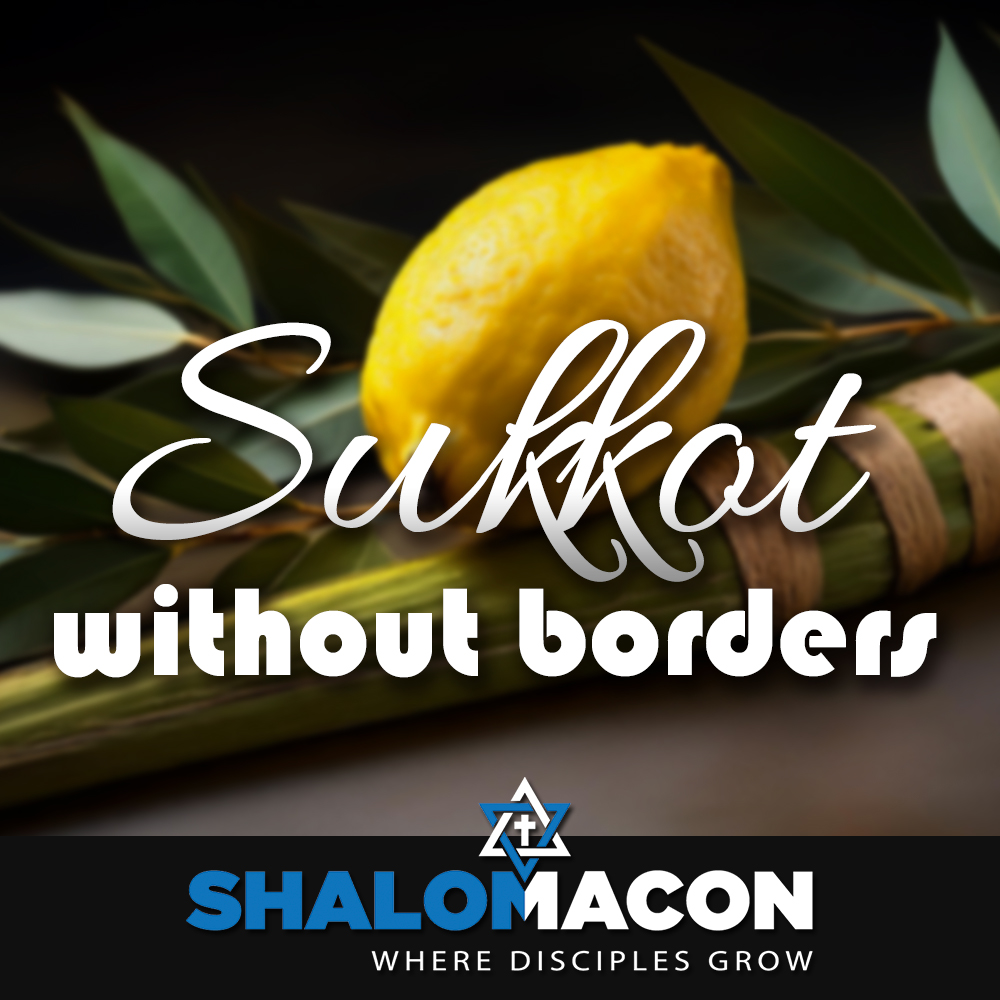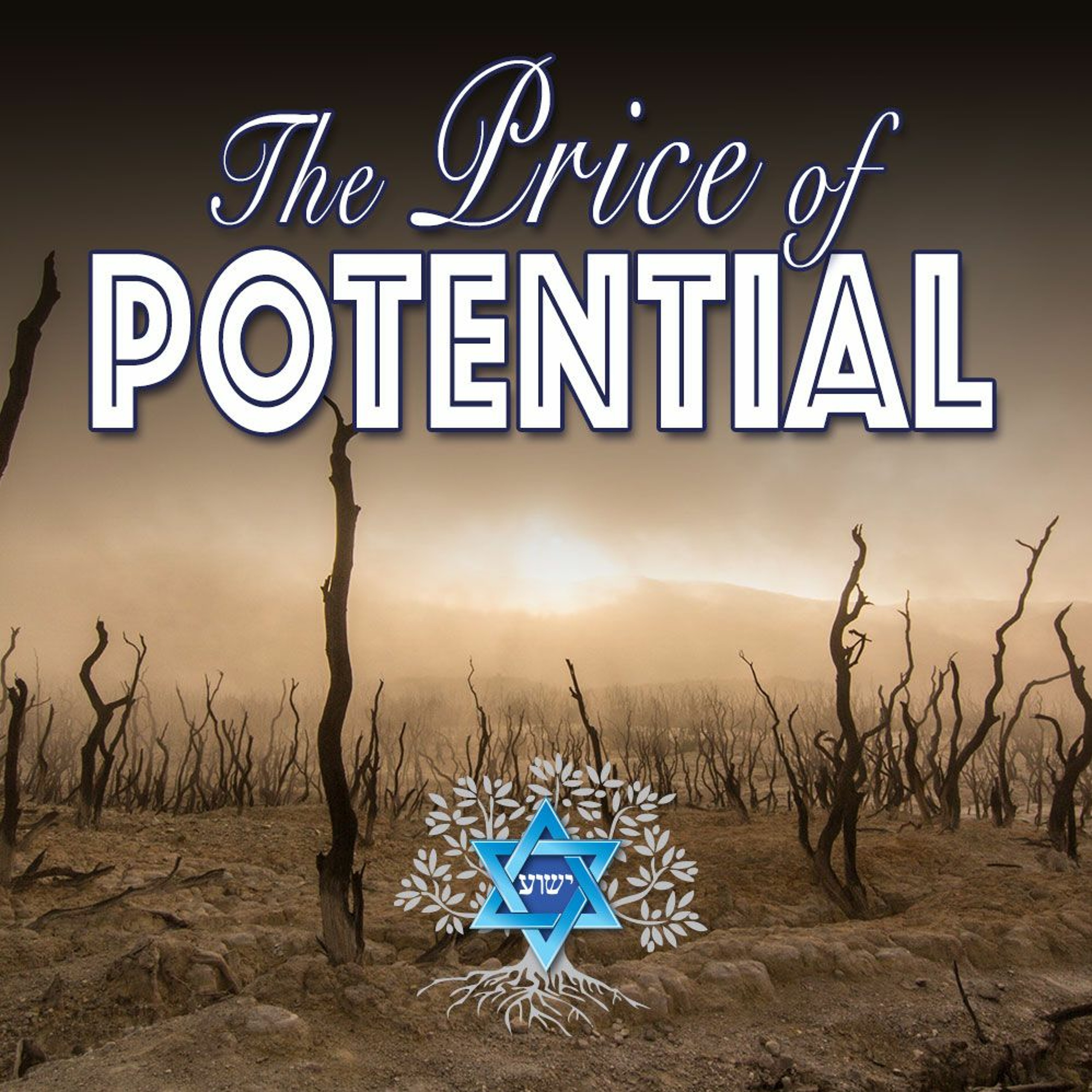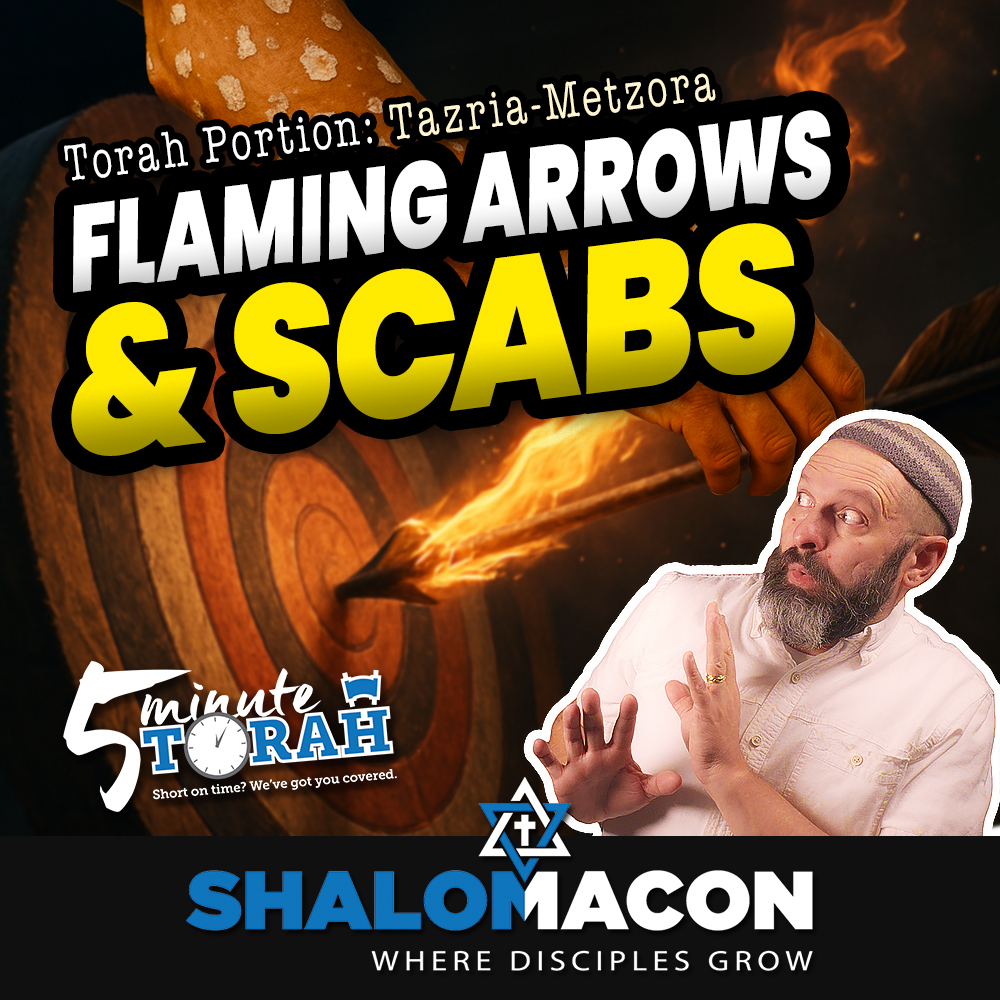Episode Transcript
[00:00:23] Speaker A: That's how the half Torah for the day one Sukkot reading goes. That's from the book of Zechariah. It says, it shall come to pass that everyone that is left of all the nations which came against Jerusalem shall even go up from year to year to worship the king, the Lord of hosts, and to keep. Which feast?
The feast of tabernacles.
Yesterday we had our ask the rabbi session and any open forum that I am ever a part of, whether it's at first fruits of Zion, whether it is at Shalom, Macon, anywhere where there's an opportunity for questions. The question that is always front and center stage is, how do we do this?
Jews and Gentiles. How far do Gentiles go into Judaism? What's the crossover? What's appropriate? How are we supposed to know? You invite us into this thing and then you say, but you can only go that far. Don't do this, don't do that. Kelly and I were talking about it last night. It's hard.
It's a little bit difficult. And sometimes it even seems unfair, like, you know, I want to do everything.
And so I always know when we're preparing for ask the rabbi that that's going to be a central part of our conversation. And I was not disappointed yesterday because we got to talk about it. But I had already started thinking about this teaching and what it says in Zechariah to the nations. We reference that a lot in messianic Judaism, particularly about the feast of tabernacles. And the reason is very, very obvious in that the majority of people in this room are from the nations. The majority of people here are not jewish.
This is actually a miraculous thing, but it deserves to be mentioned.
The Bible is very jewish. Did you know that?
From COVID to cover, it's very, very jewish. And despite what replacement theology and millennia of bad theology has told us, has tried to substitute the truth, it still is jewish. It will always be jewish until the end of the ages, and even after that.
But we can look here in the Old Testament, in the Book of Zechariah, and many other places, but specifically related to Sukkot in the book of Zechariah, and clearly see God speaking to the nations and saying, nations. I have always had you in mind.
I have always had you. I've always had a plan. This, among many other prophetic scriptures, speaks to the relationship between God and the nations. And even further back, Israel and the nations. Deuteronomy four, going all the way back to the Torah, God told Israel, I haven't made you special because you're special. I haven't made you special because I know you're gonna be perfect. I've just given you a calling. That's what it means to be chosen. It doesn't mean superior. It means chosen for a task. And that task, according to deuteronomy four, was to be, in essence, a light to the nations, which comes later in Isaiah and other prophetic scriptures. But in deuteronomy four, it says, they're gonna look at you and they're going to say, man, what nation has a Torah like this, which is reflective of a God like that?
What nation has that other than Israel? None. And we're supposed to provoke, to come in.
And Zechariah is speaking here and saying, nations, you're going to come and worship the God of the universe, specifically at this time in which we are all worshiping together.
But, you know, it's really more than a calling to the nations. It's actually sort of a commandment if you read what it says, because what he goes on to say is, Egypt.
You no come to Sukkot.
You no have rain.
No rain.
If the nations do not come up to celebrate the feast of tabernacles, I would show up. I like rain. Thank God there has not been any rain. Now, we don't pray for rain until, you know, Shmini at Serot, until we're out of the sukkah. God has been so good to us. I'll take a little bit of cold weather. Easy for me to say. I'm not camping in it. I'll take a little bit of cold weather versus a rainy sukkah, won't you? God has been very good to us, but you need to pay attention to that Zechariah scripture very closely, actually, that section to really appreciate the story of you. If you're from the nations being here today and for this sukkot weekend, kol ha notar, mikol ha goyim, then everyone who survives, of all the nations.
Okay.
Everyone who survives that have come against Jerusalem, those are the ones who shall go up.
Now, we're here to celebrate and have a good time. So we don't want to talk about a bunch of dead goyim.
But what's that all about?
Well, if we go back to the chapter, to the start of chapter 14, we get the story, he says, for I will gather all the nations against Jerusalem to battle, and the city shall be taken and the houses plundered and the women raped, and that sounds real bad. And we would think, oh, my gosh. Wow. Don't never let that happen. And then all of a sudden, we only have to look at October 7, right, and know that that literally happened down to the sexual assault, rape, and violence that took a place there.
It's almost hard to believe. And though that wasn't in Jerusalem, it was in kibbutz Beri. It was in the Nova music festival. It was in Israel.
And the nations came and killed and plundered and raped.
And while we've shed those tears, we're continuing to shed those tears until everyone is either home or appropriately remembered. We must note something really important about this.
All of the nations, okay?
There were so many nations that did not rise to the defense of Israel after this, in our own country, in our own church communities, among the disciples of Yeshua, who did nothing, rise to defend God's people and God's land. Instead, they did the opposite.
All the nations. As a matter of fact, around the world, we've witnessed it all over, probably in every single nation, there has been a coming against Israel and a coming against Israel. As much as people may want to say, well, I'm just talking about the secular government. No, most of the time, underlying it is something more. Right.
But, friends, the only point I want to make about that today is that it's easy to see from the events of October 7 how it is possible that all the nations could gather against Israel. And to take this literally, because it is a prophetic truth that one day all the nations will gather against Israel. But guess what? Not all from all the nations, because there's always a remnant. Just ask Eliyahu, who, when dealing with his own crisis, felt that he was alone, and he cried out to God, basically saying, why have you left me? Just kill me. And he says, eliahu, shh.
I have a bunch like you.
They're with you. Just settle down. Have some peace, have some faith. There's always a remnant.
Aren't you ready for some good news? As I made, no matter where, how many, no matter. All nations, by being here at Sukkot and being from the nations, you demonstrate that no matter what all means in that context, you will never be a part of that all. And so when Zechariah speaks and says, all who survived, he's talking to you. He's talking to your descendants, who you will teach and who you will raise up in the way that is to honor and to love and to cherish Israel and understand the beauty and significance of God's festivals and the fact that they, in a very very real sense belong to you as well.
And so you come to Macon for Sukkot. It's special. You can feel Sukkot if you're in tune with it. I was getting ready for it. I mean, the day before, before many of you arrived. I was thinking through teachings, and you can just feel it. Part of it's that the air is changing, the weather, the leaves, all of it. But there's a spiritual energy in the atmosphere that comes along when we go through the holidays into Sukkot. And the idea that it's not just for Israel, but extends to all nations, that is, humanity. Sukkot is a representation of God's goodness to all of humanity. It was a harvest festival. It was about God providing, it was about God protecting and including everyone in it. And, you know, this is pretty widely discussed, but it's always worth noting that the sacrifices of Sukkot listed in the Torah, they tell the story of the nations. How many sacrifices are offered during the week of Sukkot?
70.
Do you know what 70 represents?
The nations from the table of nations. 70 is the number of nations, the very festival itself, the sacrifices which remember it, the priesthood, the sacrificial system during Sukkot, the 70 bulls that shows Israel's role as a priestly nation, light to the nations and all of the nations offering prayers, sacrifices not just for Israel, not just for themselves, not just for peace, but for prosperity for the whole world. And the Sukkah itself, it serves as this picture of unity, whether, listen, whether Jew or gentile, it's a picture of unity. We all get under the same roof and we party. And that's good.
I'm good with that. It's a picture of unity. You know, in the past, we've done a Shavuot conference. We'll do it again. It's great. But even shavuot, even the Torah, the giving of the Torah, even the giving of the spirit in Jerusalem, that's a lot of jewishness, right? It was given to Israel in the desert. The Holy Spirit was given to these Jews in Jerusalem. It's still. Thank God we're all connected to that through. Beautifully connected through Yeshua. But it's still missing what we have here in Sukkot, which is these are words about the nations, these sacrifices about the nations. Sukkot as a community of Jews and gentiles gathered together to worship the king under this banner of Yeshua. It's very special for us as messianic believers, because Sukkot has come to represent the messianic age. That's a very traditional jewish understanding, that tabernacling with us, that represents the messianic age. But I want to take you back to acts 15. And you remember. Do you remember what scripture James stood up and quoted when they realized what was going on with the Gentiles?
They were trying to figure out, how can this be? There was always supposed to be a place for the nations, right? But Israel assumed. Much of Israel assumed that it would be through conversion to Judaism. We spent a lot of time talking about Paul and the book of Romans and how Paul was sort of out there because he was teaching that that wasn't the case. But traditionally, Judaism figured, if you're going to be a prophet, part of the kingdom, you got to become jewish, right?
And so these apostles are watching this happen in Jerusalem.
And the text that he draws on when he stands up is from Amos, which represents and refers specifically to what the fallen sukkah of David.
The sukkah, it shall be restored. It's from Amos. He says, after this, I will return and rebuild David's fallen tent, its ruins. I will rebuild. I will restore it. That the remnant of mankind may seek the Lord and all the gentiles who bear my name, says the Lord who do these things. It is so significant for us that we come together and do this. Under this imagery of the Sukkah and Yeshua, as the son of David will make Amos happen for the whole world, that Jews and gentiles come together. We're reminded it's this universal nature of God's plan. They saw it. James was moved to think of Amos thinking about the sacrifices for the nation. So I just.
I think about the difficulty sometimes, again, between first fruits of Zion and having so many friends from the nations who are walking this road and trying to find a place and understand it all. I think about you all the time.
It's so important that you understand how equal, valuable, and beautiful we all are. And this holiday represents that like no other. It really does.
So for me, for Kelly, for elders, the entire community at Shalom Macon, we're very happy to serve in a very particular role as a light to the nations.
That's a role and a responsibility that I understand that we have. God has revealed that to us very clearly over the last number of years. We're honored to do that. We're so happy. You know, this is not Jerusalem, but we have the privilege of welcoming so many from different backgrounds to celebrate with us. It's a reflection of being a light to the world, to the jew first. Yes. Always. That's the way it's supposed to be. But also to the greek, any greek people in here, just. That would have been cool.
We're so thankful to have the opportunity to invite everyone into the presence of God, to share the joy of the festival. Stand as a witness. You know, all of these things, but near and far, travelers online, people, Ghana. Where's Isaac? Isaac traveled from Ghana. We have Canadians. We have Californians. California is its own country.
Oregon, Washington state, all over the place.
Indiana, Hawaii. There's just.
It's like, could you get better for Sukkot than welcoming? I know it's still mostly the United States, but thank God Isaac is here, because that represents the nations.
But this last thing, this is really, really important.
It's important to remember that Sukkot is one of the shalosh regalim. It's one of the three pilgrimage festivals.
It's one where when the temple stands, and when you're in Jerusalem, you're obligated to go to Jerusalem for Passover, for Shavuot, and for Sukkot. Okay? You're supposed to show up there. You're not supposed to come empty handed. You shall rejoice in your feast, you and your son and your daughter, your male, your female servants, the Levites, the stranger, the orphan, and the widow who are in your towns. It's the Torah. It's the jewish book of law, inviting everyone. In the seven days, you shall celebrate a feast of the Lord your God, in the place which the Lord chooses, because the Lord your God will bless you in all your produce, all the work of your hands, so that you will be altogether joyful. Here's my favorite part of Sukkot. You ready?
You don't have a choice about whether you're going to celebrate.
It's a commandment from God. You shall rejoice. If you choose to not do that, not only are you robbing yourself, you're robbing God.
And you, my friends, are the ones who show up for it. Not just Sukkot, but all the feasts, but in particular, this one. You show up. So all those nations, it doesn't really mean all, because there's always a remnant. And I'm thankful that, you know, God says you're supposed to show up in the place where he will put his name. Where is that?
Jerusalem.
This isn't Jerusalem. But I'm glad God has shown up in Macon, Georgia, along with you guys to celebrate the festival of Sukkot. So, listen, we're coming now toward the end of the conference, but still welcome.
I want to thank you for being a representation of what the future of the world actually looks like, for being a foretaste of the kingdom of God, when Jews and gentiles truly do.
That's what this Torah scroll says. It says, ki beiti beit te phila yikra lechol ha umim.
For my house shall be called a house of prayer for all nations. That's the all that you represent.
And I am thankful for you, and I'm thankful that you're here. And with that, I wish you a chag sukkot sameach and Shabbat shalom.
[00:21:07] Speaker B: Please visit our website, shalommakin.org, to learn more about us. Join our live services, access other teachings, sign up for our newsletter, join our private network that will connect you with our greater community from around the world, or contribute to the work of Shalom, Macon, thank you for watching, and we look forward to connecting with you. You.



